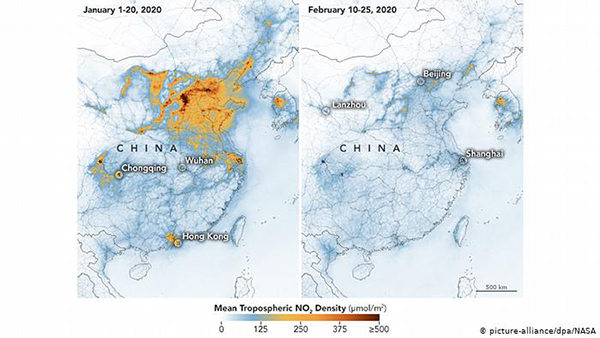 |
COVID-19 has been spread all over the world. Approximately, 2 million cases and more than 120,000 death toll worldwide impacted our daily lives, causing many social, political, and economical problems.
However, it turns out that these negative effects of COVID-19, unexpectedly brought positive effects on our environment.
The air pollution improved after the outbreak. According to NASA, the level of nitrogen dioxide in Eastern and Central China was temporarily reduced by 10-30 percent in February as factories and industrial facilities slowed down or stopped operating. Since March 21st, the level of nitrogen dioxide has dropped by 70%-80% in Barcelona.
Moreover, there was heartwarming news about wild animals. According to The Guardian, 97 hawksbill sea turtles hatched on a deserted beach in Paulista, Brazil. The turtles were able to hatch because the beach was emptied due to COVID-19. Not only in Brazil but also in India, 407,194 Olive Ridley Sea Turtles laid eggs on the beaches of Odisha from March 14 to 21, 2020.

On the other hand, there are negative arguments on these environmental effects of COVID-19.
Inger Andersen, the head of the UN Environment Programme (UNEP), maintained that “Visible, positive impacts ? whether through improved air quality or reduced greenhouse gas emissions ? are but temporary because they come on the back of tragic economic slowdown and human distress.” During the pandemic, the government would focus on preventing the spread of the coronavirus, sidelining policies related to environmental problems. After the pandemic, the financial crisis resulting from coronavirus would also stop the environmental policies, because the government would consider solving economic problems as a priority.
According to the Mackinac Center,” humans are a part of the natural environment”, and we should reject “taking pleasure in the reduction of human well-being” since “it is a self-destructive habit.” It also criticized fake news that reported Venetian canals became cleaner after COVID-19.
Moreover, coronavirus results in an increased amount of medical waste. During the outbreak, the amount of medical disposal capacity in Wuhan increased from 50 tons per day to about 214 tons per day, which is more than four times what it was before the outbreak. Increased online purchases and delivery also contribute to the increased amount of waste.
김주현 강남포스트 학생기자 webmaster@ignnews.kr
<저작권자 © 강남포스트, 무단 전재 및 재배포 금지>

 고용노동부 강남지청-세방(주), 안전문화 확산 위한 업무협약 체결
고용노동부 강남지청-세방(주), 안전문화 확산 위한 업무협약 체결


